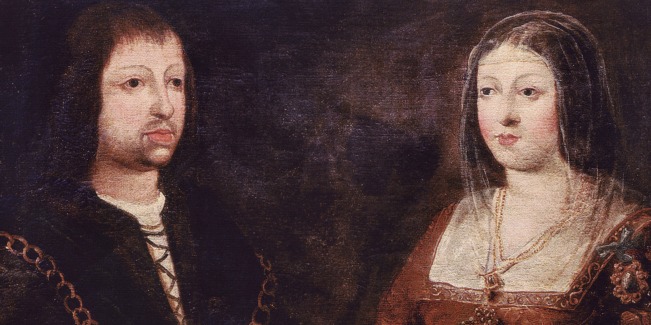
It is not surprising that many Spaniards consider the reign of the Catholic Kings as the beginning of modern Spain, and commentators of the time were aware of the historic importance of the union. When Fernando the Catholic inherited the Crown of Aragon in 1479, some members of the Royal Council even suggested that Fernando and Isabel adopted the title of Kings of Spain. They refused because both were concerned with consolidating their own power base and were jealous of external interference, even from a spouse.
Castilian writer Diego de Valera is quoted as addressing Fernando and Isabella with these words. "You have the monarchy of all the Spains and you reform the imperial throne with the blood of the Goths from which you descend and which for so long has been spilled and spread." Catalan humanists such as Cardinal of Girona, Joan Margarit i Pau, said "Hispaniam restaurate et recuperate" and in the dedication of his Paraliponenom Hispaniae wrote, "In coming to the throne of your fathers and progenitors you have returned with your matrimonial bond to the Hispanias Citerior and Ulterior the unity which since the time of the Romans and the Visigoths had been lost".
However, all contemporary commentators refer to the plural Spains, embodied in the Roman concept of separate provinces of Hispania, rather than a singular Spain of the modern state we know today. As J.H.Elliot states in his excellent Imperial Spain "The union itself was purely dynastic: a union not of two peoples but of two royal houses. Other than the fact that henceforth Castile and Aragon would share the same monarch, there would, in theory, be no change either in their status or in the form of government. It was true that, in the person of Fernando, their foreign policies were likely to be fused, but in other respects they would continue to lead the lives they had led before the Union."
Just like the Reconquista mentioned in an earlier chapter, the idea of a united Spain under the Catholic Kings is a much later, probably 19th century concept, when the nation-states and national consciousness was developing in most modern European countries. I return to the analogy with the union of England and Scotland. When James VI of Scotland became James I of England in 1603, the two countries remained separate under a single monarch until the Act of Union in 1707. Fernando and Isabel were husband and wife but ruled their respective realms separately.
Furthermore, the citizens of the two kingdoms had sense that they were part of a unified whole, either politically or culturally. The Crowns of Aragon and Castile had different laws, tax systems, political institutions, coinages, cultural traditions and languages.
It is difficult to appreciate from a modern perspective but for a Catalan, Castile was as much if not more a foreign country than much of what is now Italy. Sicily, Sardinia, Corsica and Naples had been part of the Crown of Aragon for centuries. For a Castilian, Catalonia was at least as foreign as Portugal. In the time of horse travel, Portugal was much more accessible from Castile and there were no natural borders such as the mighty Pyrenees to divide the two territories.
The reasons why Castile began to attain ascendancy were two-fold. The political model that Castile had developed was much more favourable to autocratic rule than that developed by the constituent parts of the Crown of Aragon. In Castile, the monarch had much more legislative and fiscal power than the kings of Aragon, who had to make pacts with the various parliamentary bodies before taking any decision.
Furthermore, the dynastic union of the Crown of Aragon and the Crown of Castile wasn't a union of equals. The Catholic Kings made Castile into the political pivot of the new monarchy because it was bigger, more centrally positioned in the peninsula, had a much larger population and was also going through an economic boom. The Crown of Aragon, in general, and Catalonia, in particular, had fallen on hard times due to war, plague and failed harvests. In fact, by the late 15th century Valencia was a more prosperous Mediterranean port than Barcelona.
*************
This excerpt is taken from the Chapter 8 of my forthcoming book 'Catalonia Is Not Spain: A Historical Perspective'
You can find out more on My Blog
Or help me get the book published by contributing to my Crowdfunding Project on Verkami